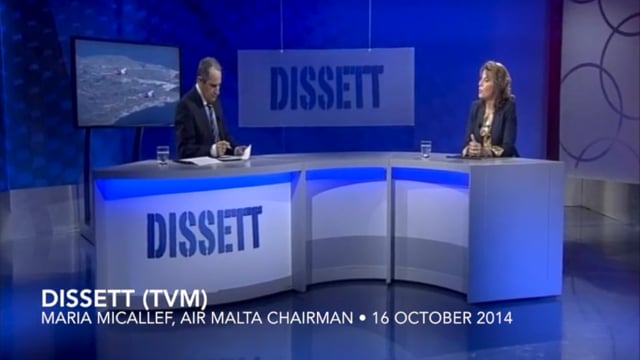Government to buy Selmun Hotel to stem Air Malta’s €25 million loss in 2015
New chairman Maria Micallef's next challenge is to keep €16 million losses in 2014, stable in the next year • 'No succession handover' from Peter Davies to Louis Giordimaina



The new chairman of Air Malta, Maria Micallef, has declared that the airline is trying to cut costs across the board in a bid to bring a forecast €25 million in losses for March 2015, down to €16 million.
MaltaToday’s report that insiders had seen a €30 million forecast loss for 2015, was never denied by the airline.
The airline is now expected to post €16 million losses in the coming weeks for the year ending March 2014.
According to Micallef, the airline is expected to "transfer" its shuttered hotel, the Selmun Palace, to the state, which will then divest itself of the property. But Green Party Alternattiva Demokratika earlier today dubbed the move a 'dangerous game' with public finances. "There is a great risk that these deals be declared as hidden state aid by the European Commission.”
“It would be short-sighted for government to pay us handsomely... there is a formula for this capital transfer,” Micallef said when questioned how much this would net the airline. “I would imagine that former tenderers for the Selmun hotel would have been informed,” Micallef said, listing various other divestment options for the airline to concentrate on its core business.
Restructuring losses, Davies's departure
“The truth is that the restructuring plan for Air Malta was only once on target – in 2012,” Micallef said.
She told Dissett presenter Reno Bugeja, the PBS Head of News, that the airline halved losses to €40 million in 2012, but then in the year ending March 2013, its losses were €30 million rather than the €15 million it targeted; and in the year of its expected breakeven, losses will be €16 million in March 2014.
She also said that former CEO Peter Davies, whose contract expired in early 2014, did not wish his contract to be renewed, and that no handover took place when Louis Giordimaina was appointed designate chief executive officer.
“Louis Giordimaina's resignation, with two weeks' notice, was a surprise to me. The board took over the day-to-day running of the company and now we are giving new CEO Philip Micallef a handover.”
She said Peter Davies had 'good communications skills', and that she was now meeting Air Malta employees and representatives of the four unions. “I need time to understand this operation, to come back to them with solutions.”
“I'm not here to carry out a saga against Davies... with the benefit of hindsight, I would have thought twice about spending €1.7 million on rebranding and a new livery or €5 million to align company processes. I would have been more careful about seeing that I do get results in the end. I don't agree with those decisions.”
Micallef said that costs had not been reduced as much as expected, despite the airline having shed 500 works and dry-leased two of its 12-aircraft fleet, which she said had actually lost the airline money.
“The restructuring plan deviated on maintenance costs that should have stayed stable. Instead, maintenance costs on our ageing fleet increased by €15 million, and certain contract changes did not deliver the €9 million savings we expected but €6 million. Basically, restructuring costs that should have been €42 million, totalled €50 million.”
€25 million loss forecast in 2015
The highly profitable Libya route, cancelled due to the ongoing conflict in the North African country, will also affect the airline’s figures for the 2015 year.
“When I took over in July, it was clear that the loss of the Libya flight will affect our operations. The first indications I had for March 2015, was that the airline will lose €25 million. From then we started a tough cost-cutting exercise across various departments to streamline out costs. Will it be a success? We’ll know when we close the 2015 books.”
Micallef said the airline wants to focus on its third-party contracts, identifying €1 million in savings from software licences, and the removal of the Selmun Hotel, whose divestment has been on the cards for over five years.
“Up until 2015… our project is to reduce costs to bring losses down from €25 million to €16 million,” she said, confirming earlier reports by MaltaToday that losses in 2015 could reach €30 million.
Competing with low-cost airlines
But she said the airline was not generating enough revenue despite a 6c5 cost of available seat kilometre [cents to operate each seat km offered] that was well within the average of 32 European airlines. “We have to improve our yield, the average price of tickets… revenue grew by €22 million but not by the €32 million that was forecasted in the restructuring plan.”
But a simple question by Reno Bugeja seemed to hit at the heart of the matter: ‘Ms Micallef, booking the same flight run by Air Malta in code-share with Lufthansa, from the Lufthansa website, is actually cheaper than booking it on the Air Malta website.’
Micallef said such “anomalies” were a problem for Air Malta’s revenue management processes.
“I don’t think a legacy airline should go head-on with low-cost airlines,” she said of Air Malta’s competition from LCCs, which forced the national airline’s market share down to 44%.
“One of the opportunities we missed out in the restructuring plan was exploiting chartered flights and tour operator business… which we have been ignoring of late.”






.jpg)















